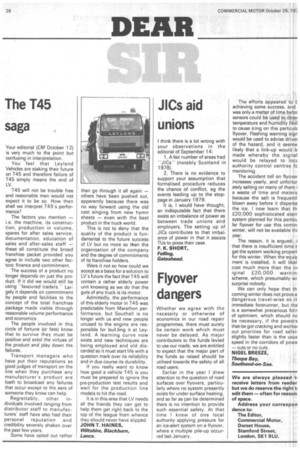Flyover dangers
Page 28

If you've noticed an error in this article please click here to report it so we can fix it.
Whether we agree with tha necessity or otherwise of economics in our road repair programmes, there must surely be certain work which must never be delayed. As major contributors to the funds levied to use our roads, we are entitled to expect that the major part of the funds so raised should be utilised towards the safety of all road users.
Earlier in the year I drew attention to the question of road surfaces over flyovers, particularly where no system presently exists for under surface heating, and so far as can be determined there is no intention to provide such essential safety. At that time I knew of one local authority applying pressure for an ice-alert system on a flyover, where a multiple pile-up occurred last January. The efforts appeared to L achieving some success, and was only a matter of time befor sensors could be used to detec temperature and humidity I ikel to cause icing on this particulE flyover. Flashing warning sign would be used to advise driver of the hazard, and it seeme likely that a link-up would b made whereby the signal would be relayed to locz authority control centres fc monitoring.
The accident toll on flyover increases yearly, and unfortur ately salting on many of them i a waste of time and materiE because the salt is frequentl blown away before it disperse the ice. I now learn that th £20,000 sophisticated alarr system planned for this partici. lar flyover for use this comin, winter, will not be available thi year.
The reason, it is argued, i that there is insufficient time t get the system working properl for this winter. When the equip ment is installed, it will likel cost much more than the or iginal £20,000 warnin, scheme, which presumably wi surprise nobody.
We can only hope that th coming winter does not prove a dangerous travel-wise as it immediate forerunner, but tha is a somewhat precarious forn of optimism, which should no be necessary, if the powers that-be got cracking and workei Out priorities for road safet: slightly faster than is the usuz speed in the corridors of powe — cuts or no cuts.
NIGEL BREEZE, Thorpe Bay, Southend-on-Sea.
























































































































